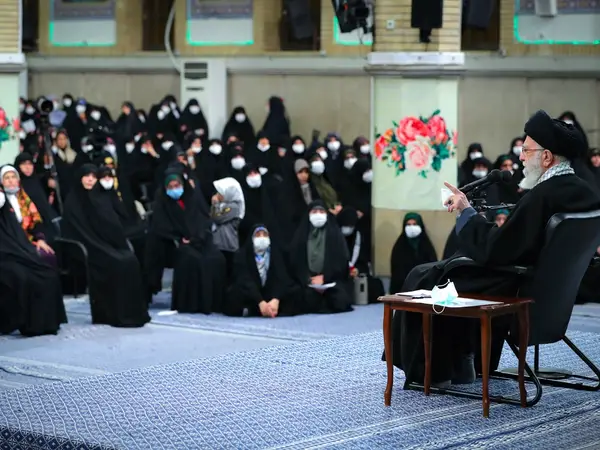Islamic Republic’s Supreme Leader Ali Khamenei has reiterated the regime’s propaganda about the current wave of protests, failing to acknowledge women’s rebellion against hijab.
Addressing a group of cherrypicked women from his supporters on Wednesday, he rejected the facts that women are unveiling in public to defy the mandatory Islamic dress code – or hijab. It was forcible enforcement of hijab in society that triggered popular protests since September - the boldest challenge the Islamic Republic has ever faced.
“The absolute brazenness of the West comes into sight when it presents itself as the forerunner of advocacy for women’s rights, whilst it is responsible for flurries of blows dealt to the dignity and prestige of women. This could be explained as utter shamelessness... This is what they suggest by women’s rights and freedom. This is by no means freedom, but rather utter slavery,” Khamenei said.
Despite a massive number of videos and photos of women and schoolgirls unveiling and burning their headscarves in protest to the compulsory hijab as well as the clerical regime, Khamenei claimed that women did not remove their hijab during the protests.
Khamenei’s refusal to acknowledge 110 days of ongoing protests, ignited by the death of 22-year-old Mahsa Amini in the hands of hijab enforcement police, has led to an explosion of tweets and posts against him and the regime on social media Wednesday.
During the hour-long session, he almost exclusively talked about women and hijab but stopped short of stating his final opinion about how to enforce hijab in society, which could lead to more protests. Khamenei called hijab a religious must but added that those who do not wear “full hijab” should not be accused of irreligious. Describing hijab as the inevitable duty for all Muslim women, at the same time he emphasized that no Iranian woman should be labeled as non-religious or anti-revolutionary if she fails to fully honor the obligation.
He criticized the intermingling of men and women in Western societies, saying that contrary to the propagated notion, the coexistence has failed to diminish men’s carnal desires and has instead amplified it, resulting in women and girls being sexually harassed on streets, in workplaces, educational centers and even in military facilities. “Sex trade, sexual slavery, violation of all moral and humanitarian principles, and legalization of issues that are forbidden in all divine religions” are now widely prevalent across the West, Khamenei claimed. He failed to mention that all these problems exist also in Iran and “men’s carnal desires” are legalized in the Islamic Republic where they can legally have up to four wives and as many concubines as they desire.
He also opted not to talk about the inequality of men and women in their basic rights. The Islamic Republic’s constitution clearly states that women are considered as inferior to men in terms of inheritance, testifying in courts and in many other areas according to the Islamic law or sharia. Women in Iran are not allowed to travel abroad without the permission of a male guardian, their share in inheritance is half of what male family members receive -- the financial compensation paid to survivors in cases of unnatural death, is also half of that of a man.
Khamenei tried to sound progressive by underlining the importance of employing efficient, experienced, knowledgeable, and wise women at various levels of Iran’s decision-making apparatus, but practically women hardly ever manage to be appointed for top jobs, let alone the jobs that are totally banned for women, such as becoming a judge. He pointed to motherhood and homemaking as the two main and primary roles of each and every woman.
In December, the Islamic Republic was voted out of the United Nations Commission on the Status of Women (CSW) for policies contrary to the rights of women and girls.
In its 2022 report on the Global Gender Gap Index, which was released in July, the World Economic Forum placed Iran at the rock bottom only after Afghanistan, Pakistan, and Congo.
